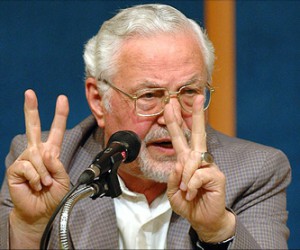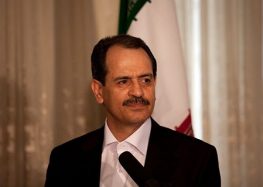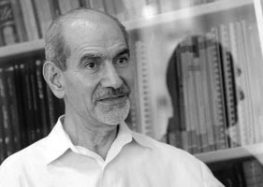Former Foreign Minister Ebrahim Yazdi Sentenced to Eight Years In Prison
 Following an eight-year prison sentence for political activist and head of the Iran Freedom Movement Ebrahim Yazdi, his son-in-law Mehdi Nourbakhsh called the ruling cruel in an interview with the International Campaign for Human Rights in Iran.
Following an eight-year prison sentence for political activist and head of the Iran Freedom Movement Ebrahim Yazdi, his son-in-law Mehdi Nourbakhsh called the ruling cruel in an interview with the International Campaign for Human Rights in Iran.
“At 80 years of age, Ebrahim Yazdi is most certainly not in physical conditions which could afford him eight years in prison. He called the ruling cruel, unfair, and unjust,” Nourbakhsh, who lives in the United States, said. “He has prostate cancer and he has another problem with his bladder, where if he is not in a hygienic environment, he could develop infections immediately. These are causes of concern for us, and he will most certainly not last eight years in prison,” he added.
Judge Abolghassem Salavati, known as “The Judge of Death,” tried Ebrahim Yazdi, head of Iran Freedom Movement, on 2 November 2010 on charges of “assembly and collusion against national security,” “propagating against the Islamic Republic regime,” and “establishing and leading the Iran Freedom Movement.” At the time, Yazdi was not sentenced and was released on bail.
In December 2011, the court sentenced Yazdi to eight years in prison and five years’ ban on social activities. Mohammad Ali Dadkhah, Yazdi’s lawyer, was informed of the ruling only three weeks ago.
“The court did not say clearly and rationally based on what evidence and documents he is a suspect,” Nourbakhsh told the Campaign. “The court did not provide any evidence for Dr. Yazdi’s charges, except for Freedom Movement flyers and Dr. Yazdi’s interviews, and statements made about the Movement’s being an illegal organization. Dr. Yazdi was accused, just like the other prisoners, without specific and rational evidence,” he said.
“According to Article 168 of the Iranian Constitution, his trial court should have been in a public and open manner with a jury, and his client and the defense lawyers should have been allowed to provide defense. None of these four conditions were met and hence his court was illegal, lacking qualification for reviewing his charges,” Nourbakhsh said. “He only said one sentence in his trial court: ‘A case has been formed and the indictment is against the Iran Freedom Movement that was formed in 1961; the Revolutionary Court lacks qualification for reviewing charges against the Iran Freedom Movement and myself.’”
Nourbakhsh told the Campaign about mounting pressure on supporters of the Iran Freedom Movement over the recent months. “The government is worried about the parliamentary elections. They are afraid the elections will be boycotted, which of course they will be. The Freedom Movement intends to not participate in the elections. In fact the recent events, Mr. Yazdi’s sentence and the imprisonment of Mohammad Tavassoli and other members, are a type of punishment for the Movement,” he said.
Recently, “Dr. Yazdi wrote a letter to [Rached] Al-Ghannouchi [the Tunisian leader], and then he wrote a letter [about election boycott] to [Seyed Mohammad] Khatami [Iran’s former President], signed by 143 individuals, all of which has set the background for recent actions against Freedom Movement members,” Nourbakhsh explained.
Ebrahim Yazdi was Iran’s first foreign minister after the 1979 Islamic Revolution. He has been arrested three times since the 2009 election and has been summoned for interrogations on numerous occasions. Yazdi was arrested last on 1 October 2010 at a funeral ceremony in a private home in Isfahan on the charge of “participating in illegal prayers.” He was then transferred to the Intelligence Ministry’s Ward 209 at Evin Prison. In January 2011, Yazdi was moved to a “safe house,” and as his health deteriorated, he was released in March 2011 to seek medical treatment.
“[Yazdi] will not object to this ruling, nor will he allow his lawyers to object to it,” Nourbakhsh said. “They are not considering appealing the decision.”



